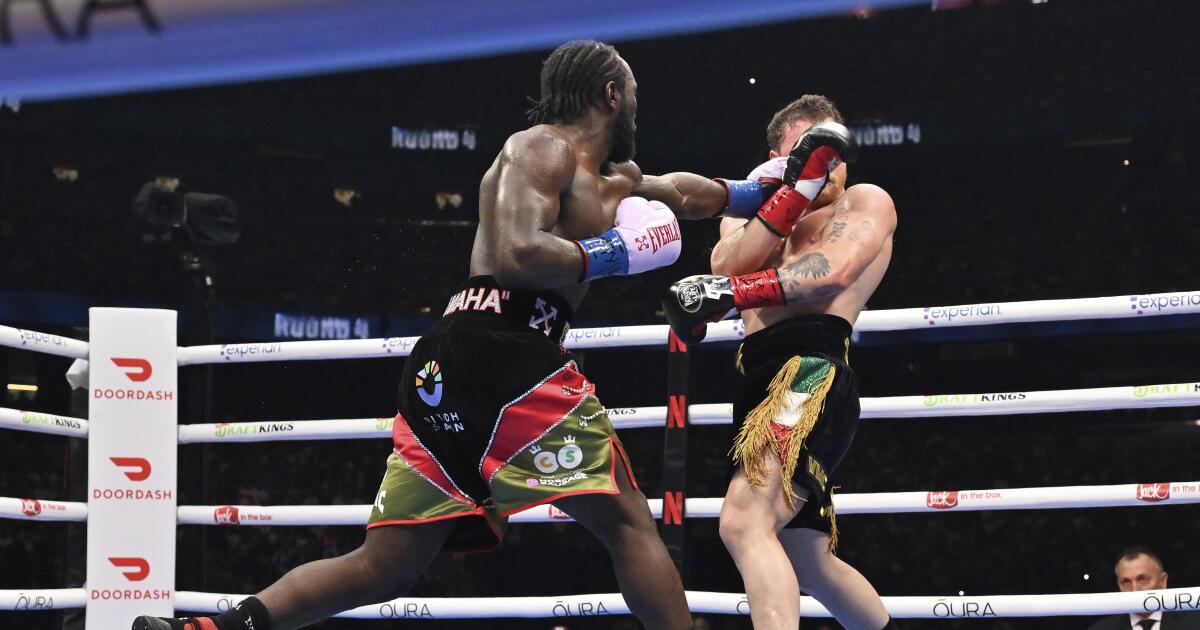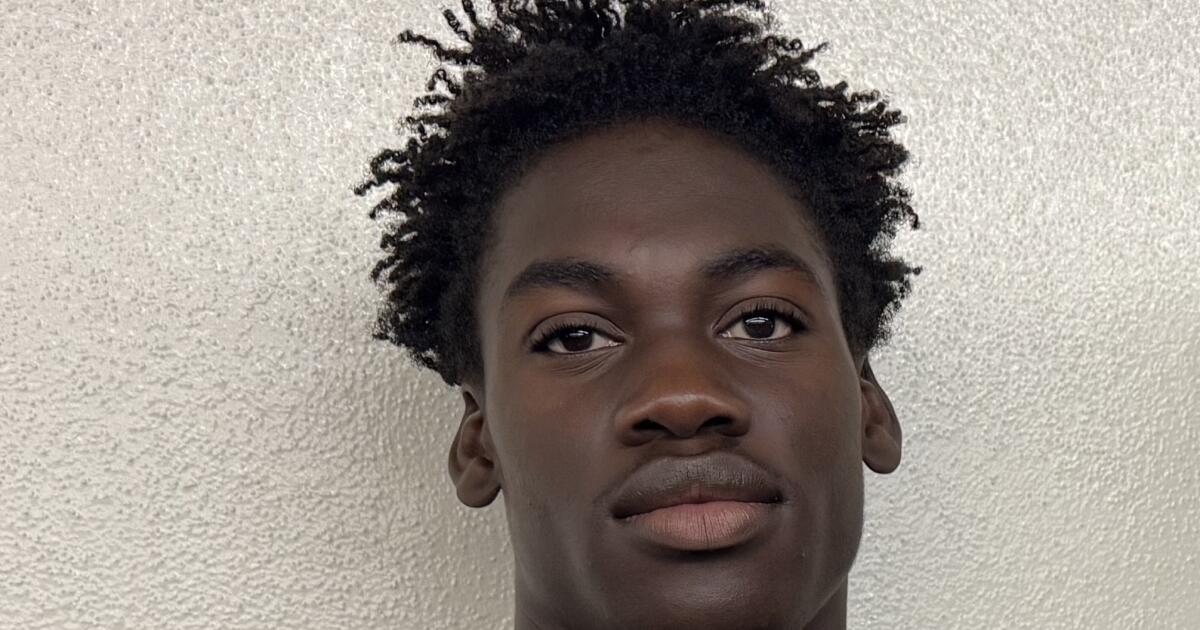For the uninitiated, the Ryder Cup is not something from which you drink coffee in your rental truck. As a matter of fact, 15 years ago, this golfing classic was proclaimed by the locals to be the biggest sporting event ever in the country of Wales.
The newest edition of the Ryder Cup will find your TV screen Friday through Monday. It will be contested on Long Island on a torture-chamber called Bethpage Black. They played the U.S. Open there in 2009 and it rained so hard and so often that there were rumors Noah was getting another Ark ready. Lucas Glover didn’t win that one. He survived it.
To be clear, this will not be the biggest sporting event in the New York area. Thursday afternoon Mets’ games create more stomach aches and fist pumps.
But it should not be dismissed or greeted by yawns.
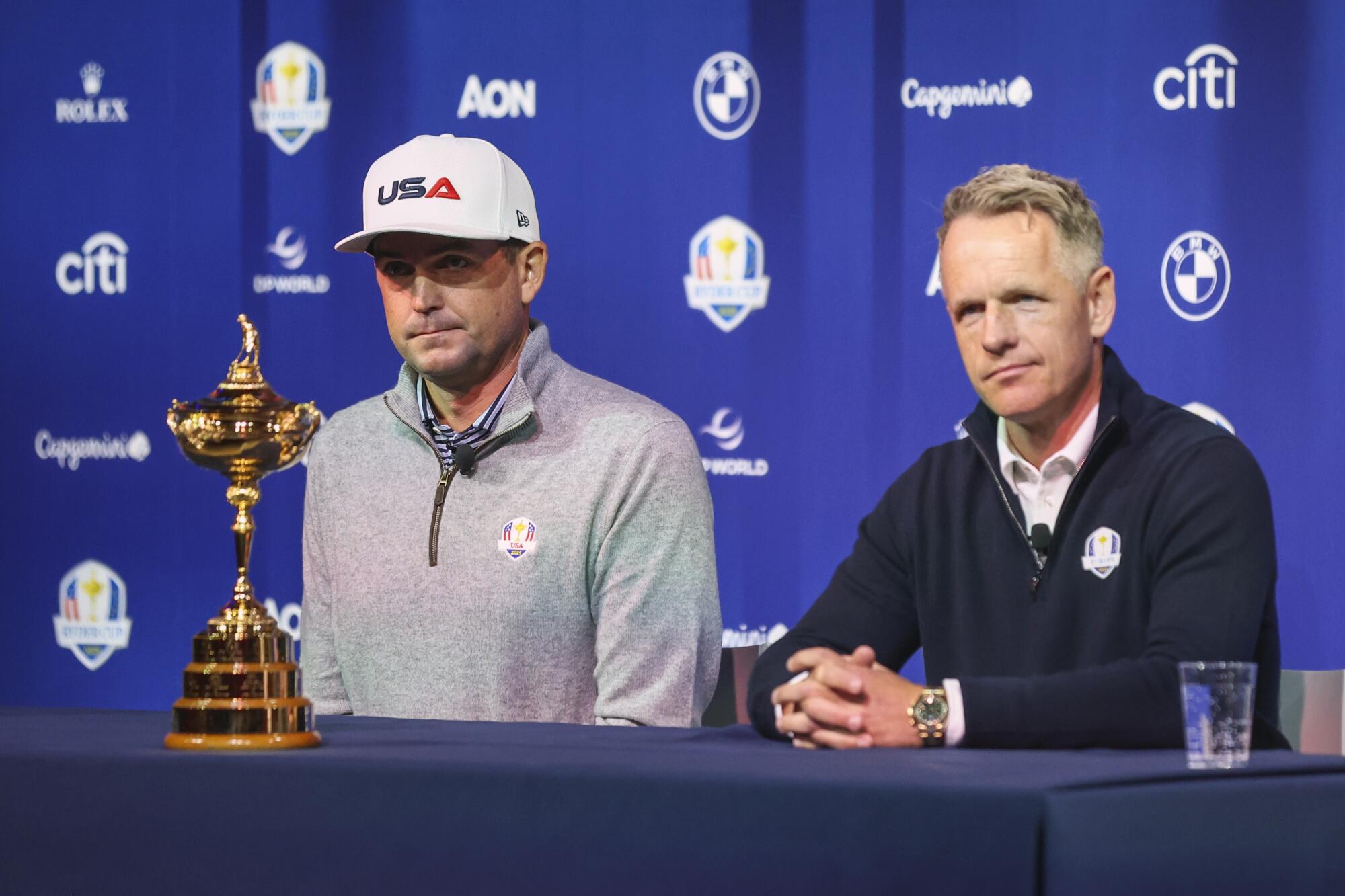
U.S. Ryder Cup golf team captain Keegan Bradley, left, and Team Europe captain Luke Donald, right, will face off this week.
(Heather Khalifa / Associated Press)
This every-other-year, alternating-home-course event that matches the best golfers in the United States against the best in Europe, creates as much emotion as you can find in a sport that preaches controlling that.
Recently, British golfer Matt Wallace shed tears on camera after falling just short of qualifying. “I will never give up on the Ryder Cup,” he sobbed.
Rory McIlroy of Northern Ireland, one of the best players ever in the sport, made the mistake years ago of calling the Ryder Cup “mostly an exhibition.” He has been apologizing for that ever since.
Spain’s Sergio Garcia, a former Masters champion and an emotional leader of many past European teams, pulled out of a European tournament immediately after he learned he would not be on this year’s Ryder Cup team. He said he needed to get away for a while.
Keegan Bradley was on U.S. teams that lost both the 2012 and 2014 Cups, and he has spoken of the still-unpacked and logoed Ryder Cup backpack that he brought back after 2012. He has vowed to never unpack it until he is part of a winning Ryder Cup team.
If you think that golf and its top players are the living definition of a sports metronome (tick-tock boring), it is not so with the Ryder Cup.
The event keeps sneaking up on people. McIlroy was right, just not up to date. By 2010, the U.S. had started to lose Ryder Cup matches, and that suddenly made them important. U.S. sports fans like a little agony and drama before celebrating winning moments. Losing is not acceptable. From 1959 through 1983, the U.S. had won every Ryder Cup. Then, in 1985, Europe won and held the cup for eight of the next 11 meetings.
Now, it was game on.
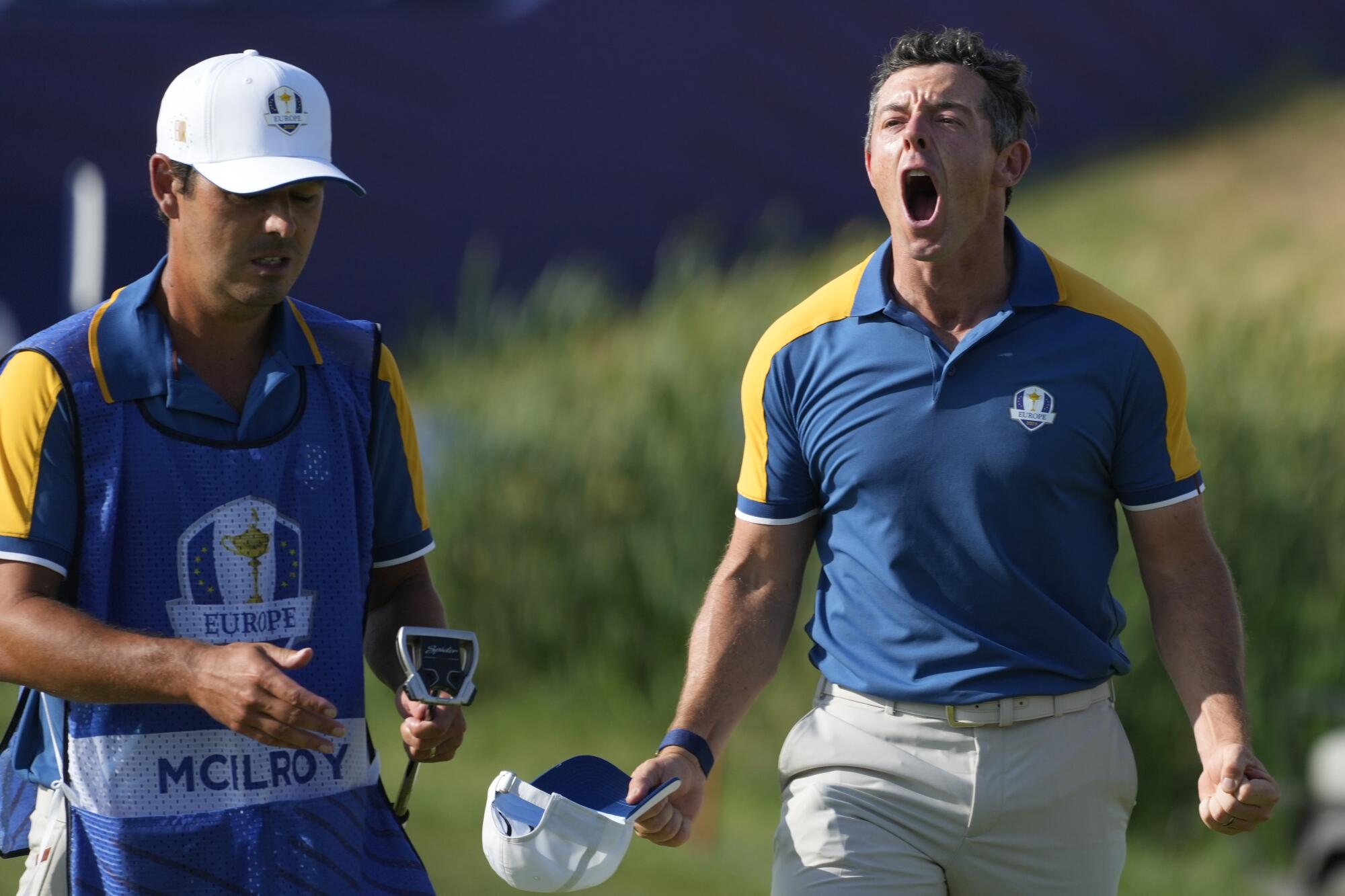
Europe’s Rory McIlroy celebrates after winning his singles match against American Sam Burns at the Ryder Cup played at the Marco Simone Golf Club in Guidonia Montecelio, Italy, on Oct. 1, 2023.
(Gregorio Borgia / Associated Press)
The U.S. won in 2008, but this time, for 2010, the Europeans were ready. They even had a special course built, clearly with one thing in mind. It was in Newport, Wales, the club was named Celtic Manor and the course was called the Twenty Ten.
They held a huge pre-celebration dinner and by the time it started, they had sold out the six-day package (three practice rounds and three competition rounds) to 45,000 people at $660 each. That $29.7 million paid nicely for the big party.
Big profits haven’t seemed to be the driving force yet in the Ryder Cup, but like everything else in sports, that is likely to change. This year’s Ryder Cup will be its most extensively televised one to date in the U.S.
Bradley, the guy with a 13-year-old unpacked suitcase, will be the U.S. captain. He has played on two Ryder Cup teams, both defeats, and lost the deciding match to Jamie Donaldson in 2014 in Scotland. The suitcase remains unpacked.
He is still one of the top players in golf, good enough to be a player on this year’s team, but chose not to choose himself and will be a traditional non-playing captain. He was also high enough in the rankings to be considered for a spot on the ’23 U.S. team that lost in Rome. He later said that, when ’23 U.S. captain Zack Johnson passed him over, “It broke my heart.”
Luke Donald of England, who played his golf at Northwestern, was good enough to be No. 1 on the PGA Tour for 56 weeks and was the first golfer to top season money-winning lists on the PGA and European tours in the same year, will be the European captain. He has played on four Ryder Cup teams, all European victories. He was also the captain in Rome.
Donald was a member of that 2010 team in Wales. The U.S. lost by a point and Donald won three of the Europeans 14½.
Celtic Manor was more than just a European win. It was a rub-your-face-in-it win, a remember-who-invented-this-game moment. It was more than winner-take-all. It was winner-celebrate-all-night and-be-smug-about-it-all-next-year.
The setting helps to understand all this.
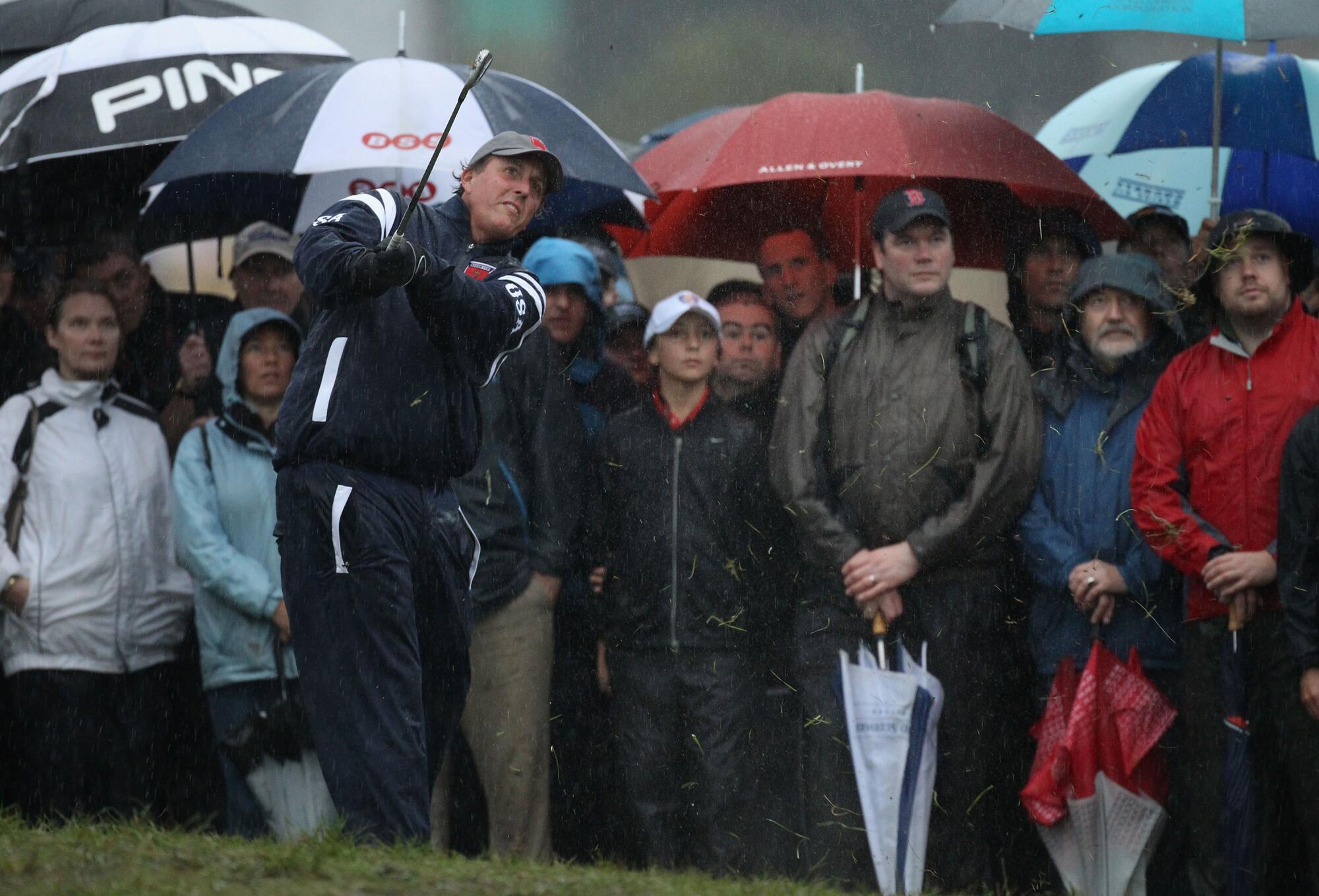
American Phil Mickelson plays a shot from the rough during the 2010 Ryder Cup at the Celtic Manor Resort on Oct. 1, 2010, in Newport, Wales.
(Ross Kinnaird / Getty Images)
The Twenty Ten course was surprisingly not a classic European links course. Much was made of that in the run-up. Why give the Americans a golf course type that they were used to — soft, grassy fairways and smooth-rolling greens — when the links courses usually drove them nuts. Then it started to rain and seemed as if it would never stop. Twenty Ten became Twenty Thousand Puddles. It was so bad that the final day of concluding singles match-play was contested on a Monday, a first for a Ryder Cup. The U.S. team was ready, with nicely logoed rain suits. Except they leaked.
Amid one particularly drenching downpour, U.S. star Phil Mickelson spotted a reporter he knew walking the sidelines. He sauntered over, soaked and dripping, eyed the reporter’s rain gear and said, “Wanna trade?”
The next day, the U.S. team got replacement rain gear from the same gift shop that the reporter had purchased his.
Such nuances are the responsibility of team captains. The Europeans, whose rain suits stayed sealed, were led by longtime tour pro Colin Montgomerie, a great player who never won a major and who many feel was the model for the Pillsbury Dough Boy. The U.S. captain was Corey Pavin, who not only won a U.S. Open in 1995 with his famous four-wood to the green on No. 18, but also was a Gutty Little Bruin, a pride of UCLA golf.
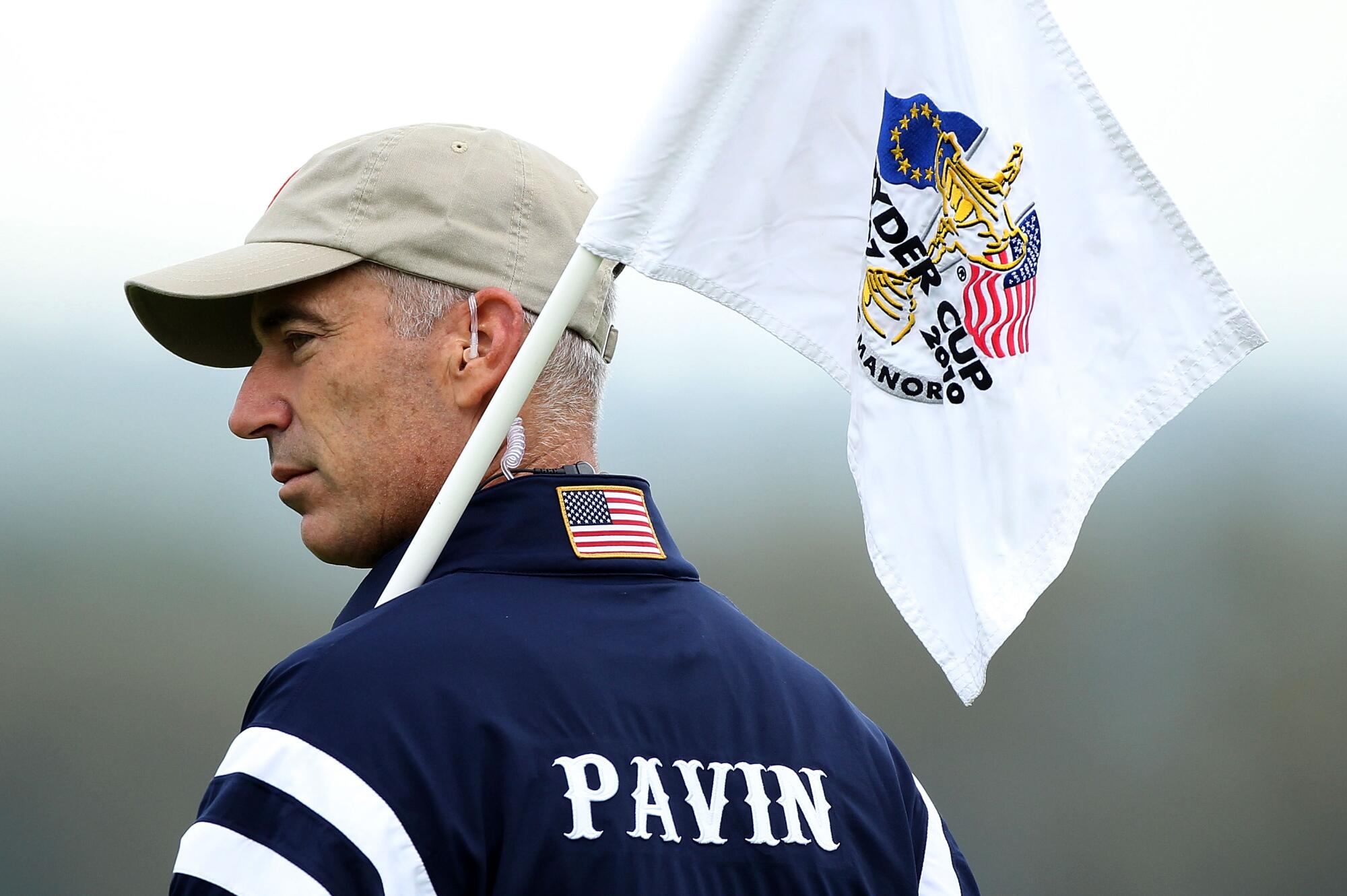
U.S. Ryder Cup captain Corey Pavin holds a flag stick during a practice round prior in 2010 at the Celtic Manor Resort in Newport, Wales.
(Andy Lyons / Getty Images)
The match, eventually won by Europe, came down to the final singles pairing on Monday. Graeme McDowell of Northern Ireland, who had won that year’s U.S. Open at Pebble Beach, was matched by Montgomerie against Pavin’s Hunter Mahan, a Texan who had been the No. 2 Ryder Cup qualifier behind Mickelson.
McDowell took a two-up lead on No. 16, making a sliding, curling 15-foot downhill putt for birdie that left him two up with two holes to play. Then, on the par three 17th — Mahan had to win this hole and the next to keep the U.S. hopes alive — Mahan chunked his second shot, a chip, short of the green. The Euro fans went wild. Mahan walked to McDowell, whose ball rested in easy two-putt, par territory, and shook his hand in concession.
Europe had won, 14½-13½, and the champagne began to flow.
The Celtic Manor clubhouse was on a hill, with a long balcony overlooking the 18th green. Within minutes, the European players were up there, shaking huge bottles of champagne and spraying them all over each other and the thousands of fans below. It went on and on. It was a post-Super Bowl-in- Philadelphia celebration, minus the bent traffic lights; a post-Lakers-win-the-NBA-title-at Staples celebration, minus the burning police cars. It produced photos that dominated every major European newspaper and TV broadcast for the next several days.
Eventually, the U.S. team shuffled into an interview room. There was not a smile to be found. All were there, a unit to the end, sitting at a long table. Quickly, a question went to Mahan about his gagged chip shot. He looked like a man who had just watched his dog get hit by a car. Before he could conjure up much of an answer, two of the three main veterans on the team ran interference. Both Mickelson and Jim Furyk jumped in to answer, saying basically, that none of the people asking the questions could have any idea of the pressure involved in a Ryder Cup situation like that. Of course, none of the people asking the questions had ever aspired to that pressure.
Tiger Woods remained silent.
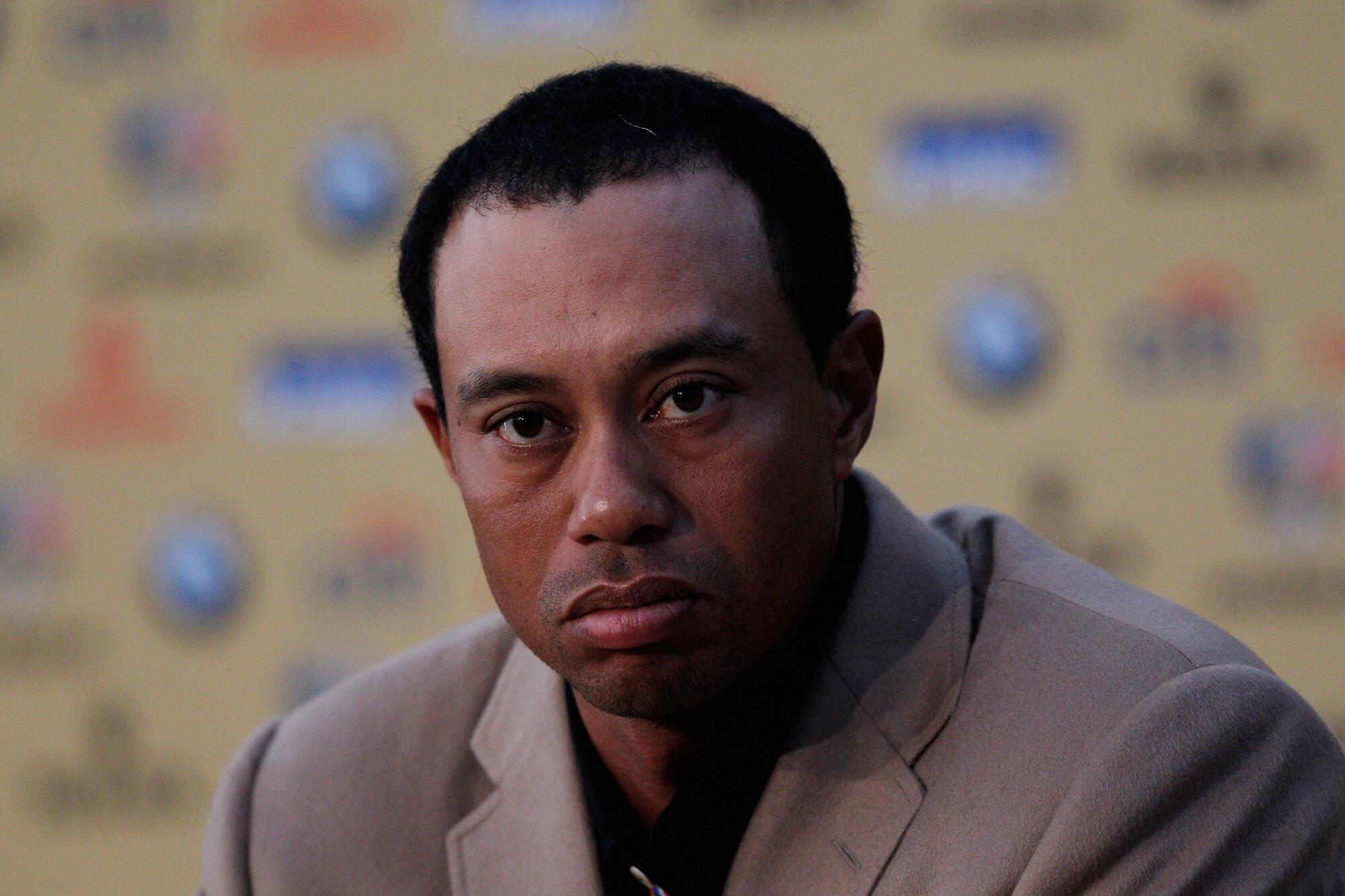
American Tiger Woods attends a tense news conference after Europe’s 14.5 to 13.5 victory over the U.S. at the 2010 Ryder Cup at the Celtic Manor Resort in Newport, Wales.
(Sam Greenwood / Getty Images)
At a press gathering before the event, he had fielded a question from a member of the British press. If there was a moment that set a tone of animosity for the event, it was right there.
Reporter: “You don’t win majors any more, you don’t win regular tournaments. Where is the Ryder Cup on your agenda, now that you are an ordinary golfer?”
Woods, the ordinary golfer: “I hope you are having a good week.”
The captains’ comparisons are fun, but probably not meaningful. Bradley has won a major, the 2011 PGA, and was ranked as high as No. 7 in the world. His Ryder Cup playing record is 4-3-0. Donald never won a major, but was World No. 1. His Ryder Cup record is 10-4-1. He was Ryder Cup captain in 2023 in Paris. He has never been on a losing Ryder Cup team, as a player or captain. Bradley’s Ryder team record is 0-2.
The only playing returnee from 2010 at Celtic Manor — Donald was also on the team — is McIlroy, who once called this whole thing an “exhibition.” That was before he stood on a balcony in Wales, 15 years ago, and looked below to a mass of idolizing golf fans, begging to be sprayed with champagne.
In that moment, the Ryder Cup became a huge deal for McIlroy. The rest of the sports world now follows.


